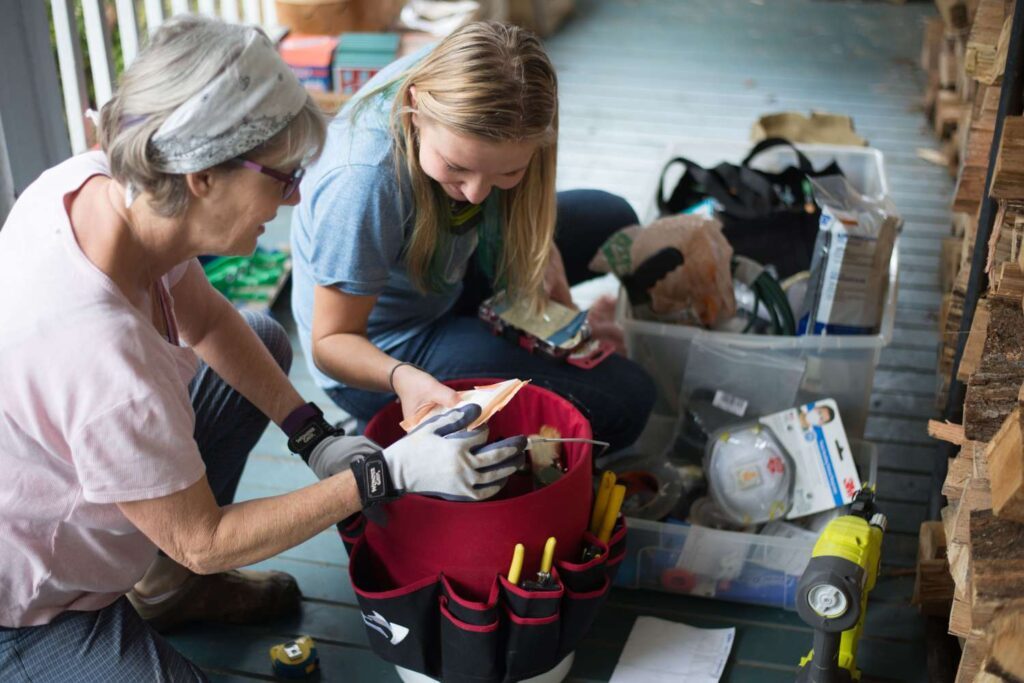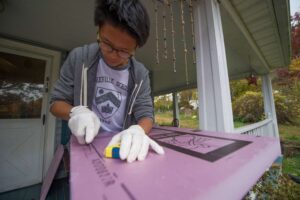Filling in the Gaps: Energy Savers Network Helps Low-Income Homes
Garret K. Woodward
It was the basketball-sized hole in the dining room window that stuck out the most for Alice Wyndham.
“It was the second house we worked on. He was a veteran who had cancer. His mother had died six months prior. He lived alone. Nobody to care for him, and nobody had cared for his house in Montford for a long time,” Wyndham said. “And there was this hole as big as a basketball in the dining room window. He had a piece of cardboard leaning up against it. In the bathroom, one of the walls didn’t touch the ceiling, so air was just going up into there. The furnace? One of the ducts wasn’t even attached.”
Wyndham is the development director for Energy Savers Network, a nonprofit volunteer organization that provides energy-efficiency improvements for low-income households in Asheville and greater Buncombe County.
“So, we went into that veteran’s house and built several interior storm windows, sealed the ceiling in the bathroom, weather-stripped the doors, and reattached the duct,” Wyndham said. “And I can’t imagine he didn’t have a warmer winter.”

In its two-and-a-half-years of existence, ESN has worked on nearly 200 homes, averaging about three a week and hitting as many as six when there are additional volunteers or other organizations chipping in to help.
Founded by Wyndham and Executive Director Brad Rouse, ESN aims to do the most with the least by going into these households and making simple adjustments that have major impacts on the heating and cooling bills, occupants’ health and general sense of well-being of a household.
“Some of these heating bills can be $200 to $500 a month and some of these people we work with have an income of around $700 a month,” Wyndham said. “It’s a social justice issue, where some of the people who can least afford the heating bills live in the homes that use the most energy.”
“It’s a vicious cycle,” said Yulia Shaffer, volunteer coordinator for ESN. “They can’t invest in fixing these things, and yet the energy bill still increases. And those savings on the heat bill can mean survival.”
“We start with a one-hour assessment, then we come back with three or more volunteers who work upwards of four hours,” Wyndham said. “We work on behavior with the occupants, educating them about things that can save energy, test their hot water heater and see if we can turn that down, work with the thermostats and turn it to a more energy-efficient setting.”
ESN’s services are free to the resident, with the organization usually spending $150 to $200 per home on supplies such as LED lightbulbs and weather stripping. Of all the green initiatives that the organization provides, ESN is especially proud of the numerous interior storm windows they install, which can prevent heat from escaping out of the windows in winter. ESN hosts weekly “window-making parties,” where they construct the windows at an estimated cost of about $20 per window.
“A big part of our niche is that nobody in town really addresses windows,” Wyndham said. “We build interior storm windows that fit in with foam around the edge so they’re easy to put in. They’re made with optical vinyl, so they’re clear, but they’re light. People can put them in, pull them out, and put them behind their couch.”
Wyndham estimates that around 40 percent of Buncombe County could qualify for the services provided by ESN.
Since August 2017, Green Built Alliance has been involved as the fiscal sponsor of ESN, which also receives support from a variety of city and state grants and other organizations.

“With Green Built Alliance, we’re able to connect with way more organizations in the region. We’re able to spread the awareness around the community,” Shaffer said. “Since we joined Green Built Alliance, it’s really given us the structure and technical support we need as a volunteer organization. We can now be more scientific about our approach.”
Though ESN is constantly buzzing with activity, client demand typically slows down in the warmer months of the year. This isn’t because there is less need; it’s simply that referrals drop off because people in need are less likely to turn to local charities when the weather is warmer. Nevertheless, ESN continues to reach out to any and all that may need its services.
“We’re always looking for volunteers to join us, and to schedule work days,” Wyndham said. “People who struggle financially don’t necessarily think about green initiatives, because they’re really just trying to meet their basic needs. But, it is a very basic need to be able to have a more efficient home to save money on heating and cooling bills. People go to these charities to get help for their heating needs. In the summer, it can be a hard to find clients, but we know they’re out there.”
To learn more about Energy Savers Network or get involved, visit energysaversnetwork.com.
You can also view this article as it was originally published on page 57 of the 2018-2019 edition of the directory.

